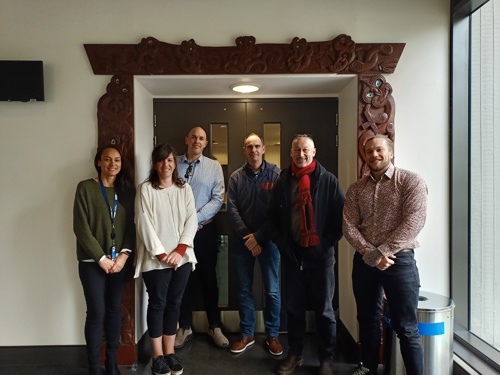Structured engagement with Māori taking shape
MWC’s first Māori Engagement Strategy is providing a powerful foundation to propel Māori voices, projects, and researchers for impactful world-leading biomedical research.

The inaugural meeting of Te Amorangi at the University of Auckland. Left to right: Dr Natalie Netzler (Ngāti Ruanui), Dr Megan Leask (Ngāi Tahu), Dr Kimiora Henare (Te Rarawa), Professor Alan Davidson (Ngāi Tahu), Associate Professor Philip Wilcox (Ngāti Rākaipāka), and Kaiārahi Māori MWC Mr Conor Watene O’Sullivan (Te Arawa, Te Rārawa, Ngāpuhi, Ngāti Maru).
During 2023, MWC’s strategy for engagement with Māori has made progress across multiple areas. The MWC leadership group, including senior MWC Māori researchers and Alan Wilcox and Associates, finalised the MWC Māori Engagement Strategy in April 2023. It was endorsed by the MWC Board in July. In September 2023, MWC Kaiārahi Conor Watene O'Sullivan and the Directorate moved through the motu, from Auckland to Waikato, Palmerston North, Wellington, Christchurch, and Dunedin, to share the new strategy with the MWC network, kanohi-ki-te-kanohi.
This year saw the initiation of Te Roopu Kōkiri, an organised support system to capture the collective energy and add weight to Māori solutions and advocacy in research. From here, the roopu will function as a whare whakaruruhou, a safe space, for Māori researchers within the MWC to express and drive an independent Māori voice and lens over current and future research within the MWC research programme.
Senior Māori researchers Professor Alan Davidson, Drs Natalie Netzler and Kimiora Henare from the University of Auckland, Associate Professor Philip Wilcox and Dr Megan Leask from the University of Otago formed Te Amorangi, the Roopu’s leadership group. They met twice during 2023 to discuss how the roopu might help bring the Māori Engagement Strategy to fruition and support Māori students and researchers in biomedical sciences. Looking ahead, the group has plans for workshops and hui in 2024 to build Māori research capability to participate in the biomedical research space.
In another initiative, Māori and Pacific early career researchers Dr Natalie Netzler and Dr Chris Puliuvea and MWC Kaiārahi Conor Watene O’Sullivan are leading changes to the MWC website to increase the accessibility of MWC research to Māori and Pacific peoples. The first tranche of this work is now complete with information on the MWC and the Centre’s research made available on the website in several languages: te reo Māori, Cook Island Māori, Samoan, Tongan and Fijian.
In the second half of 2023, a significant piece of work saw the incorporation of principles from the Māori Engagement Strategy into the Flexible Research Programme, including a research proposal assessment framework to stratify the expected level of engagement with Māori. This has been another step in advancing Māori engagement across the Centre. Conor Watene O’Sullivan says this has resulted in the growth of awareness about the importance of responsiveness to Māori in biomedical research no matter at what stage or level the research is being conducted.
“Many MWC researchers have been capitalising on the opportunity to improve their understanding of Te Ao Māori and how their research can be enhanced to create more impact.”
The impact of the MWC Māori Engagement Strategy will continue to be realised as the implementation of the strategy matures over future years. Ultimately, the goal is to use biomedical research to help remove inequities in health across New Zealand.